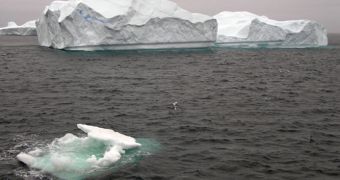Some scientists expressed enthusiasm at the idea that the melting ice caps around the Arctic could also have positive effects on the global environment. They argued that, even if climate patterns would indeed be disrupted following the ice caps breaking up, the surface of the ocean would increase. This should have been good news, considering that more water surface means more carbon dioxide absorption from the atmosphere. But a new study shows that the conclusion is false, and that this benefit is denied in the case of waters around the North Pole, Nature News reports.
Removing CO2 from the atmosphere is of paramount importance for keeping our world cool. Earth has a self-sustaining cleaning mechanism, which sees the oceans gulping up excess carbon emitted by volcanic eruptions, for example. But the addition of human-produced pollution and greenhouse gases to the mix is tipping the natural state of equilibrium. The oceans are already showing signs of acidification, which means that they are absorbing more pollutants than they can store. The phenomenon is caused by the chemical reaction between water and CO2, which yields carbonic acid.
A paper published in the July 22 issue of the esteemed journal Science shows that Arctic waters will not increase the global ocean's CO2-absorption capabilities. According to scientists at the University of Georgia in Athens, led by biogeochemistry expert Wei-Jun Cai, the Northern Ocean has already soaked up as much of the greenhouse gas as possible. Cai was the leader of an international team, which took water samples from a number of sites around the Arctic. “We found that ice-free basin areas had rather high CO2 values that approached atmospheric levels. It was not expected,” he explains.
“The results come as no surprise to me. We need to stop thinking of these systems as light-deprived. When the seasonal ice melts in the spring, what really limits phytoplankton growth is nutrients. This paper demonstrates that very well,” argues Jean-Eric Tremblay. The scientist has been studying the northern Beaufort Sea since 2002. He holds an appointment as a biological oceanographer at Laval University in Quebec, Canada.
The work also represents the first time Chinese researchers managed to produce such high-value scientific data in ocean research. “The Chinese are putting a lot of resources into catching up and eventually passing the West in terms of ocean research,” says Columbia University Lamont-Doherty Earth Observatory geochemist Bob Anderson. “This is the first time in the ocean sciences the Chinese have come out that strong. It can definitely be taken as a scientific awakening, Tremblay concludes.

 14 DAY TRIAL //
14 DAY TRIAL //